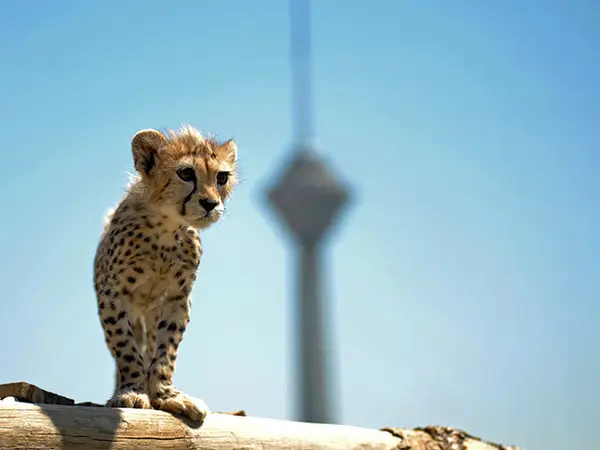Iranians are sad and angry over the death of Pirouz, the last surviving Asiatic cheetah cub born in captivity in Iran that had become a symbol of hope for ongoing protests.
Pirouz, who died in the early hours of Tuesday due to kidney failure, became one of the icons of the current wave of protests against the regime after Grammy award winning singer-songwriter Shervin Hajipour mentioned his possible extinction in the revolution song ‘Baraye.’
Before its award for Best Song for Social Change at the Grammys 2023, Shervin’s song had become a viral sensation among millions of Iranians, who are protesting against the Islamic Republic for nearly six months now. The word ‘baraye,’ which means “for the sake of”, is repeated at the start of every line of the song, which is composed of a collection of tweets by Iranians bemoaning the situation in their country: “For dancing in the streets; for the fear of kissing; for Pirouz and its possible extinction”, and “for women, life, freedom”.
Doctors at Tehran’s Central Veterinary Hospital began dialysis procedures on Monday night but could not save the cub. “I apologize to the people on behalf of myself and all my colleagues because we couldn’t keep Pirouz alive,” said Amir Moradi, the head of the hospital, in a video message.
Pirouz’s two other siblings had died in May 2022. The second offspring of the Asiatic cheetah, called Iran, died apparently due to problems caused by poor quality milk just two weeks after the first cub from the litter died, purportedly due to “congenital malformation of the left lung”. Their deaths drew widespread criticism, prompting Iran’s Department of Environment to set up a fact-finding taskforce to assess any shortcomings and negligence in dealing with the reproduction process. No findings were announced by the taskforce.
The cubs were born in the Touran Wildlife Refuge by caesarean section on May 1, in what the department said was the first birth of an Asiatic cheetah in captivity. Iran is the last country in the world where the critically endangered Asiatic cheetah can be found in the wild, where authorities launched a United Nations-supported protection program in 2001. In January, deputy environment minister Hassan Akbari said only a dozen individuals were left in the wild -- down from an estimated 100 in 2010.
Social media has exploded with photos and artworks created for Pirouz. People are also re-sharing a video showing Pirouz’s last moments in hospital. Many people blame the authorities for a lack of care, but some believe that the negligence was intentional as Pirouz -- literally meaning Victor in Persian -- had become a symbol of triumph for the ongoing protests. Pro-regime hardliners had earlier called for changing the name of the cub to a religious one.
As hashtags about Pirouz have become trendy on social media, some people and activists used the opportunity to speak about the environmental conservationists jailed in the country since 2018, condemning the regime for imprisoning the most efficient and erudite scientists.
“Wasn’t it enough for you that you detained the best wildlife scientists whose goal was to protect the cheetahs in their habitat?” asked Majid Ghazanfari, a conservationist and former TV presenter that left the state broadcaster in support of the protests, slamming the authorities for their inefficient project for reproduction in captivity. There are reports in media that the Pirouz’s mother, Iran, is pregnant again.
Iranian sociologist Mohammad Fazeli tweeted that reactions to Pirouz’s death indicates that people have become more sensitive about environmental issues. Let's express similar sensitivity for the death of water bodies, soil erosion, destruction of the forests and extinction of Zagros oak trees, constructions in the northern forests, pasture erosion, and other destructive projects and anti-environmental economy, he said, adding, “Pirouz died, long live environmental awareness and sensitivity!”
Earlier in the month, Etemad daily reported that while the Islamic Republic has launched wide-scale propaganda regarding the conditional release of some political prisoners, there has been no amnesty for environmental activists. According to the report, there are still seven environmental activists behind bars while more than five years have passed since they were arrested. Nine environmentalists and ecologists were arrested in 2018 on charges of espionage. All were members of the Persian World Heritage Foundation, an NGO dedicated to conserving wildlife in Iran, and are serving sentences from four to 10 years. Kavous Seyed-Emami, the NGO’s founder, was found dead in his cell two weeks after his detention, with the authorities reporting suicide and the family denying the claim.
Earlier in the week, imprisoned civil and human rights activist Narges Mohammadi, along with 20 of other female political prisoners, issued a statement calling for the release of the environmentalists. They said the case against them is bogus and countless human rights violations are evident in it.
